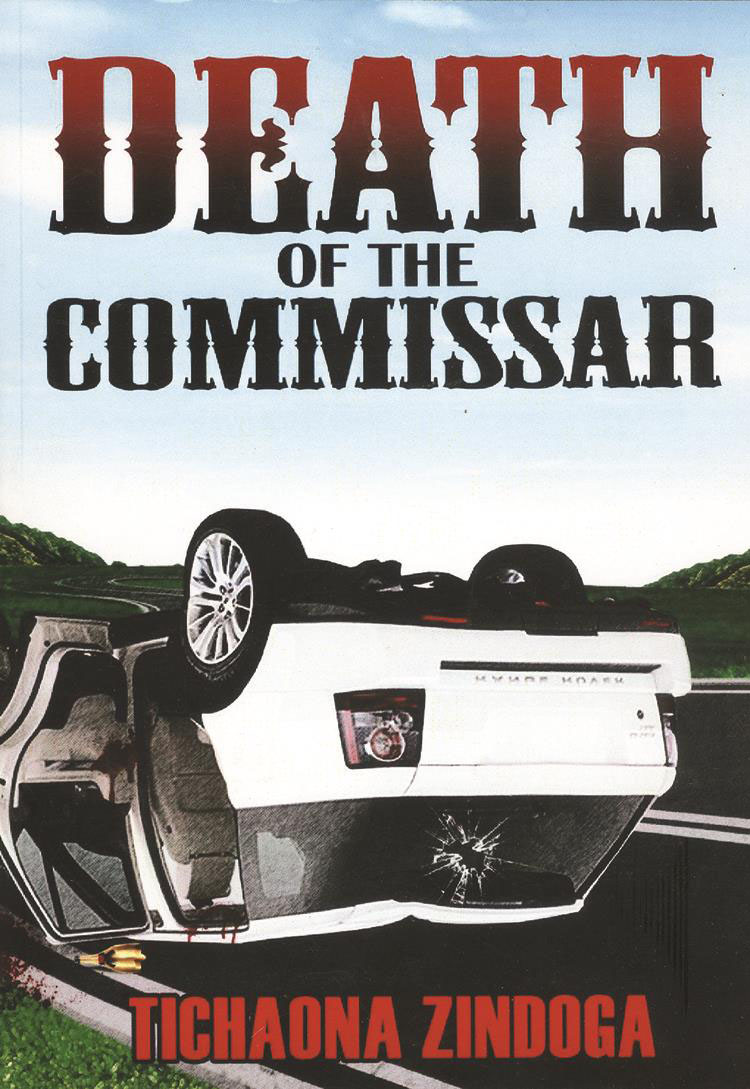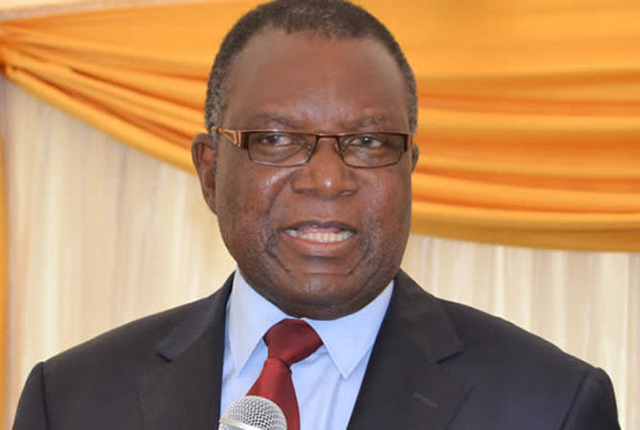When poetry, journalism meet


“Death of the Commissar” is not just a poetic mapping of the times as the writer explores his own psyche in a slew of deep cuts and also steps into other personae to tell the widest array of stories possible
Stanely Mushava Literature Today
In “Death of the Commissar” Tichaona Zindoga morphs from editor to undertaker, flaunting his body bag of political casualties in his debut into the literary world.
The able columnist announced his arrival on Zimbabwe’s literary parade with a blast of star power, convening cultural figureheads and political heavyweights at the launch of his debut poetry collection last week.
The varied guest list eminently featured War Veterans Minister Tshinga Dube, MDC-T spokesperson Obert Gutu, culture critic Sekai Nzenza, political activist Patson Dzamara, PDP spokesperson Jacob Mafume, Harare businessman Spenser Madziya and artistes Progress Chipfumo and Nox.
Creative writers are not high on book launches, ceding the carpet to business-savvy non-fiction writers. Zindoga’s arrival was a commendable exception.
“The Death of the Commissar” is contemporaneous, accomplished and accessible, humanising in everyday personae the polemical space Zindoga inhabits as The Herald political editor.
He writes with one foot in Zimbabwe and another foot in South Africa, maxing out on history, headlines and the familiar themes of love, hunger, power, solitude and war with a pictorial facility and a patriotic bassline.
The title is appetising homework for conspiracy theorists, goading on suspicious minds with a clever mash-up of shock value, clickbait and political esoterica.
But this deathly air can be deflated with a cursory look at more trigger-happy vocabulary in the artist domain – you could think of “I Shot the Sheriff”, “Sound Bouy Dead”, “Rigamortus” and those countless deaths on book covers.
With this latest title, you imagine Zindoga also announcing, figuratively: “Don’t ask me for your favourite politician. I killed them.”
Immediacy is what you go for when your daily grind revolves around pushing volumes and shaping discourse.
Zindoga gives as much in his first book.
He displays no fetish for gore, at home rather in human responses to political tragedies. The title poem is a mother’s graveside outpouring to a son who falls in a political bout like his father before him: “You hunted men as they were game/ You brought them down/ You danced the victor’s dance/ And your father smiled./ Today you have been hunted down,/ Mowed to the ground/ By the merchants of death,/ Crushed and mangled by machines of death,” the bereaved mother wails.
Although names are never overtly checked, you bump into a political figure and historical period on almost every page – Itai Dzamara (Madman of the Park), Lobengula (Death of a Monarch), Robert Mugabe (The Sun and Big Shoes), Joshua Nkomo (The Giant), Nehanda (The Prophetess), Gukurahundi (Sore of the Nation), factionalism (The War), Morgan Tsvangirai (Gods’ Ill-Favoured), Nelson Mandela (The Hero Who Never Came Back), Constantino Chiwenga (The Soldier), Mthwakazi (State of Anger) and others. Uncle Sam walks the pages with his red and blue bell-bottomed trousers and, predictably, a bull’s eye for Zindoga’s quiver, in “The Great Satan”.
Now, Zindoga may have a different checklist or even none at all but his book lends itself to conspiracy theory in that fashion. The historical appropriation is not manipulative, if you consider the empathy and recasting that goes into most of the pieces. He also cracks out of the elite-leaning cocoon of the historical poems to explore ills plaguing the base of the pyramid like xenophobia, crime, destitution and political violence.
I asked Zindoga how his journalism and his poetry cross-pollinate. “I must say actually journalism feeds from my poetry and creativity. This is why you will realise that my writing is unique and sometimes poetic in a true sense. That largely shines through the syntax and style,” he said.
“And true to poetry when I write I commit deep thought even when being apparently reflexive. Just imagine the power of a single-word sentence. Imagine that I’m trying to convey some emotion and mood of an event or situation. My journalism becomes poetry itself. It becomes music. It becomes my soul. It may be useful to point out that I craft my own headlines and I like the sounds and rhythm which I play in my head and say out loud. Poetry. And nobody does that but me,” he said.
Journalists have been accused of being sparsely read and biting style for columns. Zindoga said he is at home with unwieldy ideas and literature: “My influence is largely Thomas Hardy, style, theme and content. I like sentimentality. I like hurt and unrequited love. I like tragedy. I like Man having to trying to wrestle with Fate.”
He is visibly wresting “the Ironic Will”, towards the end of the book and traces the idea to Hardy. “This means that a man can be followed by trouble, whether material or emotional, wherever he goes in the geographical space. But beyond this philosophising, I want to appreciate that I also spoke to real issues of our contemporary and lived experiences. I talked politics; that is leadership and succession issues in SA and Zim, talked about xenophobia. I talked about disease and death,” he said.
The book is not just a poetic mapping of the times as the writer explores his own psyche in a slew of deep cuts and also steps into other personae to tell the widest array of stories possible. However, the most moving poem is “The Young Woman”, dedicated to then ailing Herald arts reporter Sophia Chese.
Sadly, this hardworking, humble, jovial, young woman – actually one of the few beautiful souls you do not have to lie in order to eulogise – died on the day of the book launch last Wednesday. I had anticipated her reaction to the poem which, by virtue of its emotive force, is one of the strongest pieces of Zindoga’s anthology. When I put out a Kindle-hosted anthology in 2015, she was the first to profile my literary strivings and this, now, was a book in which she was a moving presence.
She would leave all that for other mortals to deal with, vacate the arts desk where she sifted through music and other cultural texts and stepped into the angels’ choir. Zindoga chronicles her struggles and prays against her untimely departure in the anthology: “ . . . She kept her humour and sweet self,/ To assure us all and herself,/ That she was well and safe . . ./ We prayed solemnly, fearing for the worst,/ For she was one of our best,/ Surely, this young woman, couldn’t be the next!” Rest in peace, young scribe. There is a heaven for you.
Although “The Death of the Commissar” is the most elaborate cut of the anthology, at three pages, I hesitate to call it the lead poem. This is an anthology of 68 unique pieces, written over distinct phases, each leaning to its own energy.
My personal favourite is “The War”, an underdog’s supplication against the contagious madness of personality politics gone wrong. “The long, senseless war,/ Started way back,/When men began fighting for themselves,/And their big egos./Once upon a time,/The men were allies,/Ranged against common enemies,/Eating, plotting and scheming together/ Until they fell out . . . /Kingpins gathered young men and women,/To fight their wars,/They gave them words to say,/Pumped fires in their bellies,/And they fought publicly,/In a spectacle so ugly.” The poem is inspired by “Into the Badlands” TV series and, more importantly, a fourth estate take of factionalism.
Don’t ask the poet for your faction leaders.
Feedback: [email protected] <mailto:[email protected]>









Comments